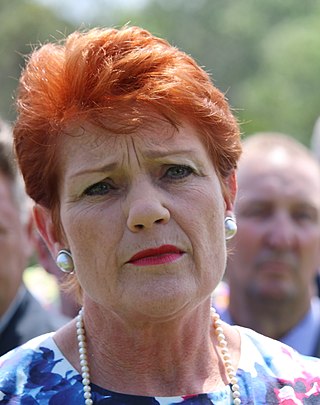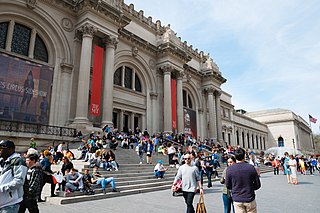Related Research Articles

Pauline Lee Hanson is an Australian politician who is the founder and leader of One Nation, a right-wing populist political party. Hanson has represented Queensland in the Australian Senate since the 2016 Federal Election.
Carlo Giuliani was an Italian anti-globalization protester who was shot dead while attacking a Carabinieri van with a fire extinguisher, by an officer who was inside the van, during the anti-globalization riots outside the July 2001 G8 summit in Genoa, Italy, making his the first death during an anti-globalization demonstration since the movement's rise from the 1999 Seattle WTO protests.

A burqa or a burka is an enveloping outer garment worn by some Muslim women which fully covers the body and the face. Also known as a chadaree or chaadar in Afghanistan and Pakistan, or a paranja in Central Asia, the Arab version of the burqa is called the boshiya and is usually black. The term burqa is sometimes conflated with the niqāb even though, in more precise usage, the niqab is a face veil that leaves the eyes uncovered, while a burqa covers the entire body from the top of the head to the ground, with a mesh screen which only allows the wearer to see in front of her.

Islamic clothing is clothing that is interpreted as being in accordance with the teachings of Islam. Muslims wear a wide variety of clothing, which is influenced not only by religious considerations, but also by practical, cultural, social, and political factors. In modern times, some Muslims have adopted clothing based on Western traditions, while others wear modern forms of traditional Muslim dress, which over the centuries has typically included long, flowing garments. Besides its practical advantages in the climate of the Middle East, loose-fitting clothing is also generally regarded as conforming to Islamic teachings, which stipulate that body areas which are sexual in nature must be hidden from public view. Traditional dress for Muslim men has typically covered at least the head and the area between the waist and the knees, while women's islamic dress is to conceal the hair and the body from the ankles to the neck. Some Muslim women also cover their face. However, other Muslims believe that the Quran does not mandate that women need to wear a hijab or a burqa.

A niqāb or niqaab, also known as a ruband, is a long garment worn by some Muslim women in order to cover their entire body and face, excluding their eyes. It is an interpretation in Islam of the concept of hijab, and is worn in public and in all other places where a woman may encounter non-mahram men. Most prevalent in the Arabian Peninsula, the niqab is a controversial clothing item in many parts of the world, including in some Muslim-majority countries.
Hijab and burka controversies in Europe revolve around the variety of headdresses worn by Muslim women, which have become prominent symbols of the presence of Islam in especially Western Europe. In several countries, the adherence to hijab has led to political controversies and proposals for a legal partial or full ban in some or all circumstances. Some countries already have laws banning the wearing of masks in public, which can be applied to veils that conceal the face. Other countries are debating similar legislation, or have more limited prohibitions. Some of them apply only to face-covering clothing such as the burqa, boushiya, or niqab; some apply to any clothing with an Islamic religious symbolism such as the khimar, a type of headscarf. The issue has different names in different countries, and "the veil" or hijab may be used as general terms for the debate, representing more than just the veil itself, or the concept of modesty embodied in Hijab.

Various styles of head coverings, most notably the khimar, hijab, chador, niqab, paranja, yashmak, tudong, shayla, safseri, carşaf, haik, dupatta, boshiya and burqa, are worn by Muslim women around the world, where the practice varies from mandatory to optional or restricted in different majority Muslim and non-Muslim countries.

Princess Hijab is an anonymous female street artist working primarily in Paris, France. Her art centres on veiling the main characters of subway advertisements using black paint.

The Met Gala, formally called the Costume Institute Benefit, is an annual fundraising Festival/gala held for the benefit of the Metropolitan Museum of Art's Costume Institute in Manhattan. The Met Gala is popularly regarded as the world's most prestigious and glamorous fashion event. Fashion stars and models are able to express themselves by their fit according to the theme and social gathering and is known as "fashion's biggest night"; an invitation is highly sought after. Personalities who are perceived to be culturally relevant to contemporary society amongst various professional spheres, including fashion, film, television, music, theater, business, sports, social media, and politics, are invited to attend the Met Gala, organized by the fashion magazine Vogue. The entry price for one ticket has risen to US$75,000 in 2024, an increase from $50,000 in 2023, to attend the annual gala in the world's principal financial center and fashion capital, New York City.

The Palestinian keffiyeh is a distinctly patterned black-and-white keffiyeh. Since the beginning of the Israeli–Palestinian conflict, it has become a prominent symbol of Palestinian nationalism, dating back to the 1936–1939 Arab revolt in Palestine. Outside of the Middle East and North Africa, the keffiyeh first gained popularity among pro-Palestinian activists; it is widely considered to be an icon of solidarity with the Palestinians in their fight against Israel.
Pauline Hanson: Please Explain! is a 2016 political documentary television film directed by Anna Broinowski exploring the history of the Australian political figure Pauline Hanson and the One Nation party as well as the controversy and debate in which both have been surrounded. The documentary features critics, commentators and former advisors, as well as archival footage.

In Australia, there is an ongoing debate over the possibility of a ban on the wearing of burqa and niqab, conservative forms of dress for Islamic women. There are currently 14 nations that have banned the burqa and niqab, including Austria, France, Belgium, Denmark, Germany, Netherlands, Latvia, Bulgaria, Cameroon, Chad, Congo, Gabon, China and Morocco.
No Jab No Pay is an Australian policy initiative which withholds three state payments – Child Care Benefit, the Child Care Rebate and a portion of the fortnightly Family Tax Benefit part A per child – for parents of children under 20 years of age who are not fully immunised or on a recognised catch-up schedule. No Jab No Play is a related policy that disallows unvaccinated children from attending preschool and childcare centres, and imposes fines on childcare centres that admit unvaccinated children. The system allows exemptions for children who cannot be safely vaccinated for medical reasons.

Camp: Notes on Fashion was the 2019 high fashion art exhibition of the Anna Wintour Costume Center, a wing of the Metropolitan Museum of Art in New York that houses the collection of the Costume Institute.
Retail politics is a type of political campaigning in which politicians directly talk to and interact with their supporters. Examples of retail politics include in-person campaign events, rallies, and direct mail. More recent examples of such campaigning have included candidates' appearances on podcasts. It is often framed as an alternative to "wholesale" politics, in which candidates attempt to reach a large number of potential voters at one time, rather than targeting a smaller number more directly. In the United States, in-person retail politics has become less common in recent years, in large part because of the increasing influence of televised debates between candidates.
Moi les hommes, je les déteste is a feminist essay by the French writer Pauline Harmange, a feminist activist and self-described misandrist. It was published in 2020, initially by the micropublisher Monstrograph, and later by a major publishing company, Éditions du Seuil.
The Eurovision Song Contest is an international song competition organised annually by the European Broadcasting Union (EBU) which features participants representing primarily European countries. One of the stated aims of the contest is that the event is of a non-political nature, and participating broadcasters and performers are precluded from promoting or referring to anything of a political, commercial or similar nature during the contest. However, several controversial moments have occurred since the event's creation in 1956, which have included political tensions between competing countries being reflected in the contest's performances and voting, disqualification of entries due to political references in song lyrics, and demonstrations against certain countries competing due to said country's politics and policies.

The burqa is worn by women in various countries. Some countries have banned it in government offices, schools, or in public places and streets.
Sinna Nasseri is an Iranian-American photographer. His work focuses on documentary photography and portraiture, and it appears frequently in the New York Times and Vogue.
Sleeping Beauties: Reawakening Fashion is the 2024 high fashion art exhibition of the Anna Wintour Costume Center, a wing of the Metropolitan Museum of Art (MMA) which houses the collection of the Costume Institute. The exhibition was announced on November 8, 2023. The exhibition is held at the museum from May 10 to September 2, 2024. It featured approximately 250 items from the permanent collection of the Costume Institute that were displayed using AI and CGI with themes of sea, land, and sky as a metaphor for the fragility and ephemerality of fashion and a vehicle to examine the cyclical themes of rebirth and renewal.
References
- ↑ Williams, Zoe (2023-05-14). "This year's Eurovision was a political statement – whatever the organisers may have wanted". The Guardian. ISSN 0261-3077 . Retrieved 2024-05-16.
- ↑ Karni, Annie (2021-09-15). "A.O.C.'s Met Gala Dress Triggered Strong Reactions". The New York Times. ISSN 0362-4331 . Retrieved 2024-05-16.
- ↑ Testa, Jessica (2021-09-16). "A.O.C.'s Met Gala Designer Explains Her 'Tax the Rich' Dress". The New York Times. ISSN 0362-4331 . Retrieved 2024-05-16.
- ↑ Hess, Liam (2022-04-27). "A Brief History of Political Statements at the Met Gala". Vogue. Retrieved 2024-05-16.
- ↑ Malekian, Somayeh; Alcini, Camilla. "Now more than ever, every fashion choice is a political statement in Iran". ABC News. Retrieved 2024-05-16.
- ↑ Murphy, Katharine (2017-08-17). "Pauline Hanson wears burqa in Australian Senate while calling for ban". The Guardian. ISSN 0261-3077 . Retrieved 2024-05-16.
- ↑ "How drag bans have made clothing a political statement, according to a queer style expert". NBC News. 2023-05-29. Retrieved 2024-05-16.
- ↑ Hanß, Stefan (2023-04-24). "Your mullet is more than a haircut, it's a political statement – a hair historian explains". The Conversation. Retrieved 2024-05-16.
- ↑ Stronach, David (1990). "The Garden as a Political Statement: Some Case Studies from the Near East in the First Millennium B.C." Bulletin of the Asia Institute. 4: 171–180. ISSN 0890-4464.